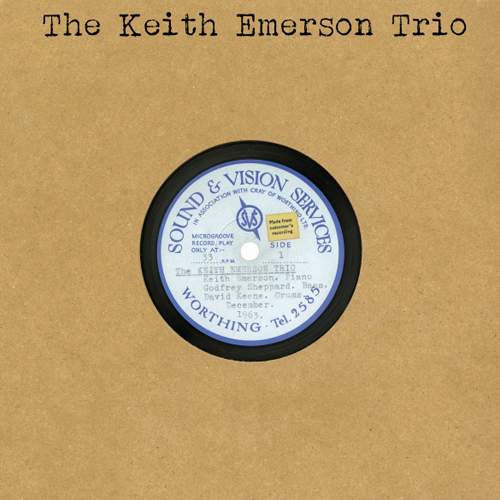In the seventies I became a fan of Keith Emerson and his band Emerson, Lake and Palmer after hearing their single Lucky Man on Dutch radio. Many of their albums and Keith's solo albums are in my album collection as you might have guessed. When I heard that an album would come out recorded at the start of Keith's career I was rather curious what this release would sound like. Therefore, I was very content when an actual promo of this CD came to our office. It was released as The Keith Emerson Trio and got the title The Keith Emerson Trio. However when I heard it the first time I was rather surprised! I will tell you why. The album we are discussing here has a collection of seven songs-the earliest known recordings of Keith Emerson that he made with The Keith Emerson Trio-a trio he formed with Godfrey Sheppard and David Keene, who played bass and drums respectively. In December 1963, in the front room of his parents' municipal rented house in Woking, the then 19 year-old Emerson captured a number of jazz songs with his trio on an old-fashioned (Philips) tape recorder. He could then only afford to cut four so-called acetates. For the uninitiated: acetate is a softer type of vinyl, often used for pressure tests of LPs. Each member of the band got one and there was a spare copy which was used to try to get gigs. This spare resurfaced last year at a boot sale, literally translated 'car boot sales' because sales often took place from the open trunk of a car. The plate was bought by a reader of the British magazine Record Collector who contacted Ian Shirley, responsible for a rare vinyl series within the magazine. Through a series of fortuitous events, Ian Shirley was already a few weeks later at the table with Keith Emerson to talk about the release of these historic recordings. The men were quick to agree with each other. Reproduced in exactly the same specifications as the original 10 "acetate is now possible to take a great look at the origins of one of the world's greatest keyboard players as he makes his way through a large number of jazz standards, among others Hank Mobley and Oliver Nelson and also 56 Blues composed by Emerson himself and named after the house where the recordings were made. The first song You Say You Care comes from an album by John Coltrane, Soul Trane from 1958. Bassist Godfrey Sheppard was idolized by Coltrane's bassist and did his best to imitate his hero. It's a nice jazzy up-tempo song with great piano improvisations. There Will Never Be Another You is a song by Harry Warren and Mack Gordon which had been adapted by Emerson. The keyboard reveals he mainly played this song to stand out from contemporaries who loved the popular The Dave Clark Five. The song starts with a slow blues tempo and moves towards a mid-tempo shuffle with another bass solo halfway. Teenies Blues was written by Oliver Nelson and dates from 1961. The title says it all. It is a slow blues song. Winckle Picker Stamp had been written by Emerson himself and was loosely based on the B-side of a song by Earl Guest from 1962. The famous honky tonk piano sound which appeared on several ELP albums can be heard here for the very first time. 56 Blues was also written by Emerson himself and can be labelled as a fast blues composition. You Came A Long Way From St. Louis is an attempt by Emerson to give his own arrangement to a Bob Russell song in an attempt to compose a song like Floyd Cramer. You can hear Beatles-like chords this time. The final track on the album is Soul Station and written by Hank Mobley in 1960 again a favourite of bassist Sheppard. It goes back to a slower pace with more traditional jazz and a leading role for the bassist of course. The sound of this release is not bad and most of all similar to a reasonable sounding bootleg. There was quite a lot of time spent to make it sound good enough for today's musical standards. If we summarize, we can say that this is a curious album from somebody who changed the music world with his playing of the keyboards. Those who expected to hear progressive rock might be rather disappointed to find out they will only hear good old fashioned jazz music from the sixties. At first I was one of them but after listening to the recordings several times I can only say I was glad I could hear how Keith Emerson started his musical career playing music that was at the time available. Shortly after I had written this review I got the news of the death of this great musician. Of course I was shocked that such a great keyboard player who was so important in the progressive rock scene, is no more! Keith thanks for all the great music you gave to us, including this release of your first steps into the music industry! *** Henri Strik (edited by Robert James Pashman) Where to buy? |
